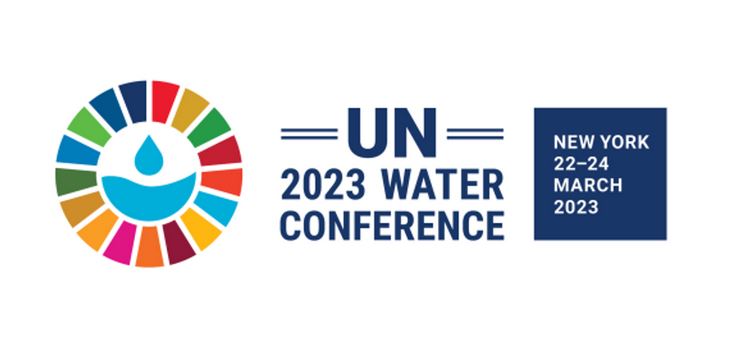Ahmedabad
(Head Office)Address : 506, 3rd EYE THREE (III), Opp. Induben Khakhrawala, Girish Cold Drink Cross Road, CG Road, Navrangpura, Ahmedabad, 380009.
Mobile : 8469231587 / 9586028957
Telephone : 079-40098991
E-mail: dics.upsc@gmail.com

Key Takeaways from UN World Water Conference
News: Recently, the United Nations held its first water conference in 46 years on March 22-24 in New York.
Background:
The U.N. recognized that we are not doing enough to meet SDG 6, which aims to provide clean water and sanitation for everyone by 2030.
The UN 2023 Water Conference's theme, 'Our watershed moment: uniting the world for water,' aimed to support the achievement of water-related global goals and objectives, including those enumerated in the 2030 Agenda for Sustainable Development.
About UN Water Conference on freshwater:
It was held in the context of serious environmental issues — flooding, drought, severity of climate change and a looming food crisis.
The conference marked a mid-term review of the Water Action Decade 2018-2028
Advance the water agenda by energizing existing programmes and projects
Inspiring water action to achieve the 2030 Agenda, in particular Sustainable Development Goal 6 (SDG 6), which envisages the sustainable management of water and sanitation for all.
Key outcomes of conference:
The central outcome of the conference was the international Water Action Agenda, to which governments, multilateral institutions, businesses, and non-governmental organizations submitted over 670 commitments to address water security issues.
Nearly 164 governments and 75 multilateral organizations have made commitments.
The commitments embodied in the Water Action Agenda are voluntary and, therefore, legally non-binding. However, the voluntary commitments are expected to inspire the collective political will, which is needed to address the many water challenges.
There were specific innovations in wastewater treatment or solar treatment of water in remote areas, and several proposals for incubation platforms, including the IBM Sustainability Accelerator, focused on water management.
A potential useful tool to address water issues was the W12+ Blueprint, a UNESCO platform that hosts city profiles and case studies of programs, technologies, and policies that address common water security challenges.
The conference highlighted that the lack of incentives is a major hindrance for farmers and industries to use water efficiently and sustainably. The integration of environmental, social, and corporate governance into the Water Action Agenda is a positive step towards effective water governance.
Challenges that need to be addressed:
According to The World Resources Institute (WRI the commitments made by the states reflected scope and ambition but it lacked proper finance and targets that are quantifiable in nature.
There are serious limitations in our knowledge about the volume, flux and quality of water in lakes, rivers, soils and aquifers.
There are huge gaps in water usage data. The metering of water has triggered resistance from India to Ireland because of concerns about equitable access and affordability of water services’.
Funding from regional, national, and international sources prioritizes new water infrastructure rather than on water maintenance services (World Bank study). It results in decreased service for water customers.
The World Bank estimates project recurring operations and maintenance service (WASH) costs to rise from about $4 billion to over $30 billion per year by 2030, which is far more than the capital costs for basic WASH services.
Water does not qualify to be a global public goods as it is not considered to be an area of urgent funding as compared to climate change.
What was India’s commitment at conference?
An investment of $240 billion in the water sector and efforts to restore groundwater level.
Importance of Groundwater in India:
Groundwater is the backbone of India’s agriculture and drinking water security in rural and urban areas. It meets nearly 80% of the country’s drinking water and two-thirds of its irrigation needs.
According to CAG report (2021) the groundwater extraction in India increased from 58% to 63% between 2004-17. This has further increased due climate change resulting in intermittent rainfall, which further undermines the recharge potential.
The revised Groundwater Bill 2017 vests State groundwater boards with creating laws, managing water allocation and other relevant issues.

Address : 506, 3rd EYE THREE (III), Opp. Induben Khakhrawala, Girish Cold Drink Cross Road, CG Road, Navrangpura, Ahmedabad, 380009.
Mobile : 8469231587 / 9586028957
Telephone : 079-40098991
E-mail: dics.upsc@gmail.com
Address: A-306, The Landmark, Urjanagar-1, Opp. Spicy Street, Kudasan – Por Road, Kudasan, Gandhinagar – 382421
Mobile : 9723832444 / 9723932444
E-mail: dics.gnagar@gmail.com
Address: 2nd Floor, 9 Shivali Society, L&T Circle, opp. Ratri Bazar, Karelibaugh, Vadodara, 390018
Mobile : 9725692037 / 9725692054
E-mail: dics.vadodara@gmail.com
Address: 403, Raj Victoria, Opp. Pal Walkway, Near Galaxy Circle, Pal, Surat-394510
Mobile : 8401031583 / 8401031587
E-mail: dics.surat@gmail.com
Address: 303,305 K 158 Complex Above Magson, Sindhubhavan Road Ahmedabad-380059
Mobile : 9974751177 / 8469231587
E-mail: dicssbr@gmail.com
Address: 57/17, 2nd Floor, Old Rajinder Nagar Market, Bada Bazaar Marg, Delhi-60
Mobile : 9104830862 / 9104830865
E-mail: dics.newdelhi@gmail.com